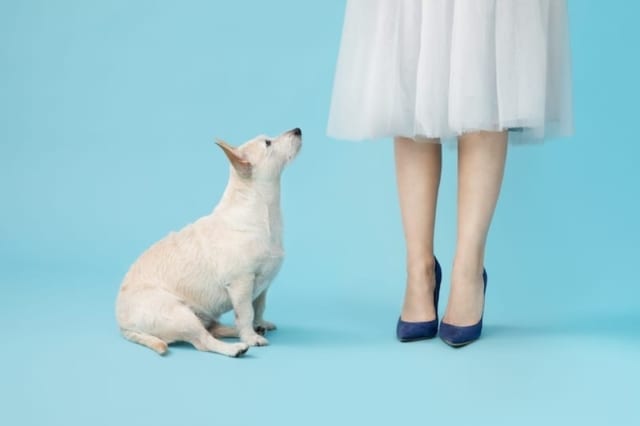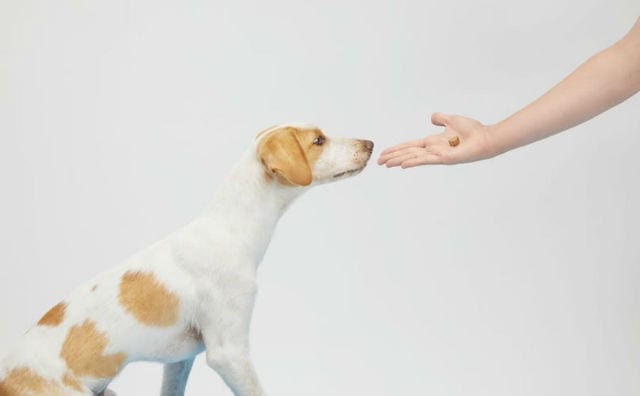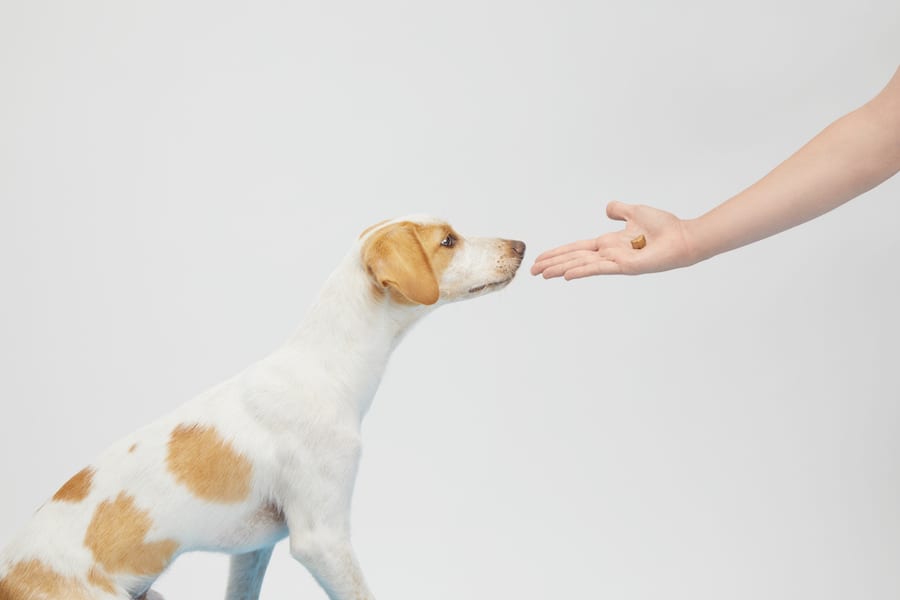***Looking for a gift to keep your pup stocked in treats for training? Check out BarkBox! Every month BarkBox delivers 2 original toys, designed in-house, 2 full bags of all-natural treats, and a chew. Sign up here and receive a free extra toy every month. <– This deal is worth up to $120 in value if you sign up for a 12-month subscription! 🙂
In a perfect world, every puppy would be born with an innate ability to follow commands, listen to their pet parents, come when called, and never, ever misbehave.
But let’s be real—we don’t live in a perfect world. Your dog doesn’t automatically know what you want him to do the second you bring him home. The only way your pup will know how to behave is if you train him.
There are plenty of training tips that can help you train your own dog. But if you have a pup who’s a bit of a handful—or if you just want to get the most out of your dog’s training—the best thing you can do? Get your pup a trainer.
But it’s not like you have a trainer on speed dial. So you’re probably asking yourself the question “How do I find a trainer for my dog?”
And that’s a great question! Let’s dig into how to find a trainer that’s friendly, qualified, and will have no problem teaching your dog to sit, stay, and stay out of your shoe collection:
First Things First: Know What You’re Looking For


The first key to answering the question: “How do I find a trainer for my dog?” Know what you’re looking for.
Dog training is not a regulated industry. Technically, anyone can call themselves a dog trainer regardless of their experience, training, and ability to actually train your dog. That’s why it’s important to know what questions to ask and what criteria to look for when evaluating potential trainers.
Some of the information you’ll want to gather about potential trainers include:
- Training methods. There are a number of different training methods, but many believe the most effective and humane method is positive reinforcement training. Trainers who use positive reinforcement training reward your dog for positive behaviors. They also help replace inappropriate or problematic behaviors with better, more appropriate ones. And bonus for your pet—this method involves plenty of delicious treats!
- Education. There’s no nationally recognized credentials for dog trainers. But you definitely want to work with a trainer with plenty of professional training. Ask any potential trainers about their educational background and what trainings or certification programs they’ve gone through to qualify them for dog training. You also want to ask about their continuing education; dog training is an evolving industry, so you don’t want to work with a trainer who hasn’t learned anything new in the past 10 years.
- Areas of speciality. “Dog training” is a broad term. If there’s a specific issue you’re having with your dog, you want to make sure whatever trainer you work with is uniquely qualified to deal with that issue. So, for example, the right trainer to teach your new puppy basic commands isn’t necessarily going to be the right trainer to help your two-year-old dog deal with his separation anxiety. Ask your trainer what areas of dog training they specialize in. Then, make sure that area is aligned with you and your pup’s needs.
- Services. Again, every dog trainer is different. So, when you’re looking for a trainer, you want to make sure they offer the services you need. Ask any potential trainers what services they offer to make sure they’re the right person to train your pup.
- Price. You don’t want to cut corners when hiring a dog trainer. But if you have a limit on how much you can spend, you’ll definitely want to get an idea of each potential trainer’s prices.
- References. One of the most important things you can ask a potential dog trainer for is a list of references. Past clients will be able to give you a realistic idea of what to expect from a trainer. They can also let you know what level of success they experienced with their own dogs. If a trainer has a host of glowing references, chances are, they’ll be great with your dog. And if the trainer refuses to provide any references? There’s probably a reason—and it’s not someone you would want to work with, anyway.
Where To Look For A Dog Trainer


Alright, so now that you know what to look for in a trainer—and what questions to ask when you’re evaluating them. Now, let’s jump into where you can look to find them.
Look Online
These days, you find just about everything online—so why not dog trainers?
The internet is a great resource for finding qualified dog trainers. You can either search review sites (like Yelp) for trainers in your area or tap into a resource like The Association of Professional Dog Trainers, which has a handy search tool that allows you to search for professional dog trainers within a specific mile radius (the tool also allows you to filter by “Certified Trainers Only”).
Visit Your Local Pet Store
Another great place to find top-notch trainers? Your local pet store.
Often times, pet stores will have at least a few trainers they know, work with, and would recommend. Some even have trainers on staff and offer training classes of their own! Stop by your local store and see if they have or know of any trainers they think would be a good fit for your pup.
Ask For Recommendations
Arguably the best way to find an amazing trainer? Tap into your personal network and ask for recommendations.
Think of anyone you know that might know or have worked with a dog trainer—like friends and family members, your vet, or other dog owners in your neighborhood—and ask if they have anyone they’d recommend. Getting in touch with a trainer through someone you trust is a great way to put your mind at ease and know the trainer you’re working with is high quality (otherwise, the person that recommended them would never hear the end of it!).
Don’t Commit To A Trainer Until They’ve Met Your Dog


Once you’ve found a dog trainer you think would be a good fit for your pup, there’s one more important step you need to take before you decide to work with them—and that’s introduce them to your dog.
You want to make sure that whatever trainer you hire is not only qualified, but is someone your dog feels comfortable with. Sometimes, the dog/trainer chemistry just isn’t there—and if it’s not there, it’s much better to know before you start working with them.
If the meet and greet goes well—and your dog seems to take to your trainer—congratulations! You have officially figured out how to find a trainer for your dog. And before you know it, your dog will be able to sit, stay, and follow commands with the best of them.
Want More Articles Like This?
How Do I Train My Dog To Be A Therapy Dog?
Are Board And Train Programs Right For My Dog?
How Training And Boarding Can Help Your Dog
What Do I Need To Know Before I Board My Dog?






